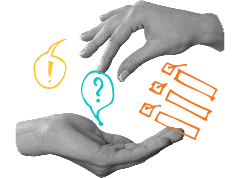Apartheid in South Africa- Seconde- Anglais
- Fiche de cours
- Quiz et exercices
- Vidéos et podcasts
English settlers soon joined them and Cape Town became an important trading post on the route to India.
The end of the eighteenth century saw a
period of unrest, with wars between the
Boers and African tribes such as the
Bantus and the Zulus.
Cape Town became a British possession in 1814, and
the British began to settle in surrounding regions,
which were then called British South Africa.
The Boer war (1899-1902) was a conflict
between the British and the Boers.
Britain won.
This led to the setting up of the South African
Union in 1910. It was a British
dominion of the Commonwealth, with its own
government under British rule.
It remained so until the Republic of South
Africa was proclaimed in 1961.
In 1948, Afrikaaners were elected to
govern the dominion, and they implemented the
apartheid policy, which consisted in separating
the whites from other ethnic groups.
Tribal and traditional African ways were recognized by
the Black Authorities Act of 1951, and
allowed to develop in exclusively black
homelands.
In 1959, the Black Self-Government Act gave the basis
for the independence of the nine ethnic groups
identified in the country. Black homelands or
territories were set up, so that the colored
population would not mix with the whites.
Colored people had no rights, and lived in
townships (ghettos). They had to carry an
internal passport if they wished to travel
out of their homelands.
Finding decent jobs was very difficult
for them. Their schools and hospitals
were second-rate, and they lived in constant
fear of the white police and armed forces.
Apartheid meant total segregation between the races in South Africa, with the power and the economy firmly in the hands of the white population.
Meanwhile, black dissatisfaction was growing.
Clandestine movements, such as the African
National Congress, worked at dismantling
apartheid.
Black activists were arrested, tortured and killed.
Pressure from the United Nations and a
world-wide embargo on South African trade helped
the fight against apartheid.
Finally when Frederik W. De Klerk was elected president in 1989, he freed ANC leader Nelson Mandela and began peace talks with the black leaders.
The Manifesto for a New South Africa published
in 1991 meant the end of apartheid. De
Klerk and Mandela obtained the 1993 Nobel
Peace Prize for their work.
In 1994 after an election in which all
South Africans could vote for the first time ever,
Nelson Mandela was elected president of the
new Republic of South Africa.
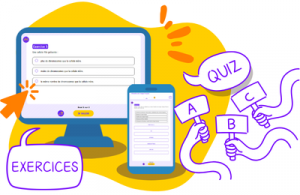
Des quiz et exercices pour mieux assimiler sa leçon
La plateforme de soutien scolaire en ligne myMaxicours propose des quiz et exercices en accompagnement de chaque fiche de cours. Les exercices permettent de vérifier si la leçon est bien comprise ou s’il reste encore des notions à revoir.
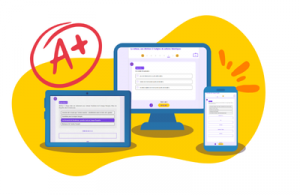
Des exercices variés pour ne pas s’ennuyer
Les exercices se déclinent sous toutes leurs formes sur myMaxicours ! Selon la matière et la classe étudiées, retrouvez des dictées, des mots à relier ou encore des phrases à compléter, mais aussi des textes à trous et bien d’autres formats !
Dans les classes de primaire, l’accent est mis sur des exercices illustrés très ludiques pour motiver les plus jeunes.

Des quiz pour une évaluation en direct
Les quiz et exercices permettent d’avoir un retour immédiat sur la bonne compréhension du cours. Une fois toutes les réponses communiquées, le résultat s’affiche à l’écran et permet à l’élève de se situer immédiatement.
myMaxicours offre des solutions efficaces de révision grâce aux fiches de cours et aux exercices associés. L’élève se rassure pour le prochain examen en testant ses connaissances au préalable.
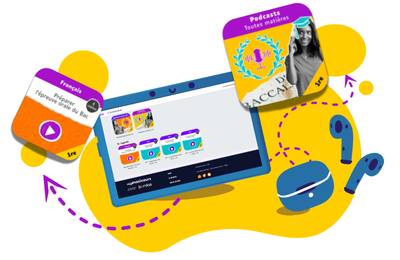
Des vidéos et des podcasts pour apprendre différemment
Certains élèves ont une mémoire visuelle quand d’autres ont plutôt une mémoire auditive. myMaxicours s’adapte à tous les enfants et adolescents pour leur proposer un apprentissage serein et efficace.
Découvrez de nombreuses vidéos et podcasts en complément des fiches de cours et des exercices pour une année scolaire au top !
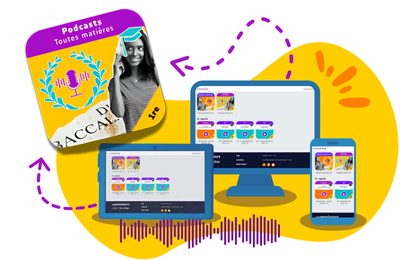
Des podcasts pour les révisions
La plateforme de soutien scolaire en ligne myMaxicours propose des podcasts de révision pour toutes les classes à examen : troisième, première et terminale.
Les ados peuvent écouter les différents cours afin de mieux les mémoriser en préparation de leurs examens. Des fiches de cours de différentes matières sont disponibles en podcasts ainsi qu’une préparation au grand oral avec de nombreux conseils pratiques.
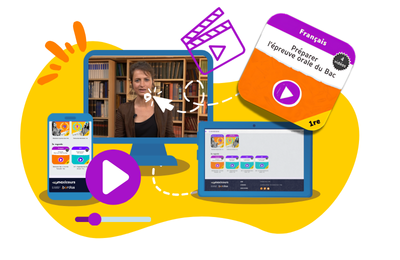
Des vidéos de cours pour comprendre en image
Des vidéos de cours illustrent les notions principales à retenir et complètent les fiches de cours. De quoi réviser sa prochaine évaluation ou son prochain examen en toute confiance !




